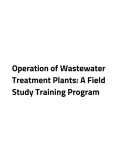Georgia Biological Wastewater Treatment System Operator Class II License
The Biological Wastewater Treatment System Operator Class II License allows you to do the following work:
- Remove pollutants from industrial or domestic wastewaters prior to discharge to a stream, sewer or land
- Perform the duties of a wastewater laboratory analyst in conducting certain tests for reporting purposes as defined by the Georgia Board of Examiners for Certification of Water & Wastewater Treatment Plant Operators and Laboratory Analysts without further certification
- Operate facilities for the treatment and disposal of wastewater, including industrial process wastewater
- Control wastewater collection systems and industrial wastewater treatment plants without further certification
- Apply processes to wastewater
- Biological
- Physical/chemical
- Settling
- Operate
- Sanitary sewers
- Pipes
- Manholes
- Pumps
- Other apparatus used to convey sewage to wastewater treatment plants
The Georgia Biological Wastewater Treatment System Operator Class II License can work on a Class I or II plant or system that the operator is currently operating.
How to Get the Biological Wastewater Treatment System Operator’s Class II License in Georgia?
- Complete 48 hours of an advanced water operator course with one of the Water & Wastewater Treatment Plant Operators Board-approved providers
- Meet the experience requirements:
- Option 1 - High School Diploma, GED: 24 months of experience
- Option 2 - Accredited Associate Degree in Biology, Chemistry, or, at the Board's discretion, other degrees containing sufficient courses in biology or chemistry: 18 months of experience
- Option 3 - Accredited Bachelor of Science Degree in Biology, Chemistry, or, at the Board's discretion, other degrees containing sufficient courses in biology or chemistry: 12 months of experience
Gather the necessary documents:
- High School/GED/College Transcript
- Job Description
- Experience Dates
- Proof of Training
- Prerequisite Certification
- Immigration Documents (If applicable)
- Affidavit of Citizenship
- Background Check: can be obtained at the local law enforcement office
- Secure & Verifiable Document
- Background Consent Form (If applicable)
- Coursework
- Disciplinary Action/Sanctions
- Court Documents
- Letter of Explanation
- Notarize and submit the application along with the required documents to the Board at:
Board of Examiners for Certification of Water and Wastewater Treatment Plant Operators and Laboratory Analysts
237 Coliseum Dr.,
Macon, GA 31217 - Take and pass the trade examination administered by AMP/PSI©
- Await the Board's response regarding the certificate issuance
Georgia Biological Wastewater Treatment System Operator Class II License Exam Prep Course
Georgia Biological Wastewater Treatment System Operator Class II License Exam
Below is all the information related to the trade exam, including the official reference list.
Georgia Biological Wastewater Treatment System Operator Class II Trade Exam
- Testing Method: Computer-based testing; closed book
- Testing Company: PSI©
- Number of Questions: 100
- Types of Questions: Multiple choice
- Subjects Involved (No. of Questions):
Laboratory Analysis (15)
- Follow laboratory Standard Operating Procedures (SOPs)
Collect samples for the following:
- Bacteriological analyses
- Biological analyses (e.g., BOD, CBOD)
- Chemical analyses (e.g., COD, nutrients, metals)
- Physical analyses (e.g., pH, temperature, DO, settleable solids)
Conduct the following:
- Bacteriological analyses
- Biological analyses (e.g., BOD, CBOD)
- Chemical analyses (e.g., COD, nutrients, metals)
- Physical analyses
- Process control laboratory testing
- Required regulatory laboratory testing
Interpret data from the following:
- Bacteriological analyses
- Biological analyses (e.g., BOD, CBOD)
- Chemical analyses (e.g., COD, nutrients, metals)
- Physical analyses (e.g., pH, temperature, DO, settleable solids)
Equipment Evaluation & Maintenance (20)
- Calibrate meters (e.g., flow, pressure sensors)
- Follow safety rules and guidelines when working with chemical equipment
- Follow safety rules and guidelines when working with mechanical equipment
- Monitor flowmeters
- Monitor telemetry systems
- Perform basic electrical troubleshooting
- Perform preventative maintenance on equipment
Inspect the following equipment:
- Aeration basins
- Aeration systems (e.g., blowers, surface aerators, diffusors)
- Aerobic digesters
- Air compressors
- Analyzers (e.g., DO, pH, H2S, ORP)
- Attached growth / fixed film (e.g., RBC, trickling filter)
- Bar screens
- Chemical feed systems (e.g., polymer, ferric)
- Chlorination systems
- Clarifiers / sedimentation basins
- Dechlorination systems
- Disinfection equipment (e.g., UV, ozone)
- Flow equalization systems
- Gates and valves
- Generators
- Grit removal processes
- Hand tools
- Heavy equipment
- Hoists and cranes
- Instrumentation (e.g., flow, pressure, telemetry)
- Mechanical dewatering equipment (e.g., presses, centrifuges)
- Mixers
- Motors
- Pumps - centrifugal
- Pumps - positive displacement
- SCADA systems
- Solids thickening processes (e.g., DAF, belt, rotary drum)
- Suspended growth (e.g., activated sludge, MBR, SBR)
Maintain the following equipment:
- Aeration basins
- Aeration systems (e.g., blowers, surface aerators, diffusors)
- Aerobic digesters
- Air compressors
- Analyzers (e.g., DO, pH, H2S, ORP)
- Attached growth / fixed film (e.g., RBC, trickling filter)
- Bar screens
- Chemical feed systems (e.g., polymer, ferric)
- Chlorination systems
- Clarifiers / sedimentation basins
- Dechlorination systems
- Disinfection equipment (e.g., UV, ozone)
- Gates and valves
- Generators
- Grit removal processes
- Hand tools
- Heavy equipment
- Instrumentation (e.g., flow, pressure, telemetry)
- Mechanical dewatering equipment (e.g., presses, centrifuges)
- Mixers
- Motors
- Power tools
- Pumps - centrifugal
- Pumps - positive displacement
- SCADA systems
- Suspended growth (e.g., activated sludge, MBR, SBR)
Equipment Operation (25)
- Analyze data to evaluate and adjust equipment
- Check filters for proper operation
- Conduct wastewater pipe repairs
- Follow safety rules and guidelines when working with chemical equipment
- Follow safety rules and guidelines when working with mechanical equipment
- Follow Standard Operating Procedures (SOPs)
- Monitor lift stations to ensure equipment is operating properly
- Monitor motor control center
- Transport biosolids offsite for disposal / reuse
Operate the following:
- Aeration basins
- Aeration systems (e.g., blowers, surface aerators, diffusors)
- Aerobic digesters
- Air compressors
- Analyzers (e.g., DO, pH, H2S, ORP)
- Attached growth / fixed film (e.g., RBC, trickling filter)
- Bar screens
- Chemical feed systems (e.g., polymer, ferric)
- Chlorination systems
- Clarifiers / sedimentation basins
- Dechlorination systems
- Disinfection equipment (e.g., UV, ozone)
- Filtration and exchange units (e.g., sand, membranes)
- Flow equalization systems
- Gates and valves
- Generators
- Hand tools
- Heavy equipment
- Hoists and cranes
- Instrumentation (e.g., flow, pressure, telemetry)
- Mechanical dewatering equipment (e.g., presses, centrifuges)
- Mixers
- Motors
- Odor control devices (e.g., biofilters, scrubbers)
- Power tools
- Pumps - centrifugal
- Pumps - positive displacement
- SCADA systems
- Solids thickening processes (e.g., DAF, belt, rotary drum)
- Suspended growth (e.g., activated sludge, MBR, SBR)
Treatment Process Monitoring, Evaluation, & Adjustment (30)
- Add chemicals to disinfect and deodorize water and other liquids (e.g., ammonia, chlorine, lime)
- Analyze laboratory data to evaluate and adjust processes
- Follow industry safety rules and guidelines applicable to treatment processes
- Implement changes as indicated by laboratory results
- Operate chemical feed systems (e.g., polymer, ferric)
- Operate odor control systems (e.g., biofilters, scrubbers)
- Operate SCADA systems
- Operate the preliminary treatment processes (e.g., screening, grit, flow equalization)
- Operate the primary clarification /sedimentation processes
Operate the following secondary treatment processes:
- Attached growth / fixed film processes (e.g., RBC, trickling filter)
- Secondary clarification / sedimentation processes
- Extended aeration processes (e.g., package, SBR, oxidation ditch)
- Conventional activated sludge processes (e.g., step feed, plug flow, complete mix, MBR)
- Operate the nutrient removal systems
Operate the following disinfection treatment processes:
- Chlorination processes
- Dechlorination processes
- Disinfection processes (e.g., UV, ozone)
Operate the following solids treatment processes:
- Aerobic digestion process
- Mechanical dewatering processes (e.g., presses, centrifuges)
Security, Safety, & Administrative Procedures (10)
- Adhere to established safety procedures (e.g., lock-out / tag-out, confined space, hazard communication, fall protection)
- Complete operation reports
- Complete required regulatory reports
- Conduct routine security checks
- Ensure compliance with all applicable regulations
- Generate maintenance reports (e.g., daily, monthly, annual)
- Implement spill notification policy
- Inspect SCBA equipment
- Receive chemical deliveries and store
- Schedule routine activities (e.g., maintenance, operations)
- Update Standard Operating Procedures (SOPs)
- WPI Biological Wastewater Treatment System Operator Class II Official Content Outline
Georgia Biological Wastewater Treatment System Operator Class II Book Set
This set of books includes all required references for the Biological Wastewater Treatment System Operator Class II exam. Orders placed before 2 PM are shipped the same day via UPS and a tracking number is emailed before 3 PM.
GEORGIA BIOLOGICAL WASTEWATER TREATMENT SYSTEM OPERATOR CLASS II - BOOK SET WITHOUT TABS INCLUDES ALL BOOKS FOR TRADE AND BUSINESS EXAMS
Sales price: $2,970.56-
GEORGIA BIOLOGICAL WASTEWATER TREATMENT SYSTEM OPERATOR CLASS II - BOOK SET WITH TABS INCLUDES ALL BOOKS FOR TRADE AND BUSINESS EXAMS
Sales price: $3,070.56
Georgia Biological Wastewater Treatment System Operator Class II Exam Books
Books Not Allowed in Testing
-
This reference has the necessary material for...Advanced Waste Treatment
r1501 1$146.65$146.65 -
The book describes how wastewater treatment p...Operation of Wastewater Treatment Plants. A F
r1307 1$135.79$135.79 -
This book will have important information on ...Operation of Wastewater Treatment Plants Volu
r1502 1$79.94$79.94 -
Activated Sludge - Manual of Practice OM-9, 2...Activated Sludge - Manual of Practice OM-9
r1503 1$85.06$85.06 -
Basic Laboratory Procedures for the Operator-...Basic Laboratory Procedures for the Operator-
r1504 1$185.32$185.32 -
Chlorination/Dechlorination Handbook (publish...Chlorination/Dechlorination Handbook
r1505 1$116.01$116.01 -
Operation of Extended Aeration Package Plants...Operation of Extended Aeration Package Plants
r1506 1$113.33$113.33 -
The 3-volume book set of Operation of Municip...Operation of Municipal Wastewater Treatment P
r1509 1$1,321.30$1,321.30 -
Operation of Nutrient Removal Facilities is a...Operation of Nutrient Removal Facilities - Ma
r1507 1$179.99$179.99 -
Understand wastewater biology with the help o...The Microlife
r1508 1$126.66$126.66 -
This book provides a comprehensive and detail...Standard Methods for the Examination of Water
r1312 1$480.51$480.51












